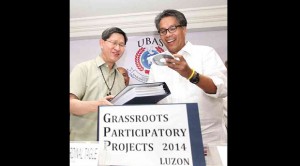
INTERIOR Secretary Mar Roxas, whose department would implement GPB, poses with Manila Archbishop Luis Antonio Cardinal Tagle after signing a deal for the Church to help monitor the use of funds for the program. CONTRIBUTED PHOTO
PALAYAN CITY, Philippines—Local governments and civil society groups in Central Luzon launched last week a signature campaign to draw support for the government’s grassroots participatory budgeting (GPB) system and protect development projects for the region.
The drive was led by 250 Central Luzon leaders who gathered to help defend the budgeting system, which critics described as another pork barrel wielded by President Aquino.
Peñaranda Mayor Ferdinand Abesamis, Luzon cluster president of the League of Municipalities of the Philippines, said the GPB was “a classic example of people empowerment.”
“It helped push projects selected by the people themselves, skirting an older process where elected leaders chose projects for their constituents,” he said.
According to the Central Luzon office of the Department of Interior and Local Government (DILG), the 2014 national budget has allocated P758,483,110 for 770 projects identified under the GPB in five cities and 47 towns in Central Luzon.
The Department of Agriculture has the biggest share from these GPB appropriations to undertake 172 projects, the DILG said.
The agency said 31 of the GPB projects have been completed, 253 are on-going and 486 have been put in the pipeline.
Abesamis said the Supreme Court ruling that portions of the Aquino administration’s disbursement acceleration program (DAP) were unconstitutional, has led to delays in the implementation of some GPB projects.
“Why would we let these (projects facilitated by the GPB) go?” the mayor asked.
Marco Polo Ferrer, national secretary of Kilos Mamamayan, said the signature campaign would also support the passage of House Bill No. 4113 introduced by Camarines Sur Rep. Maria Leonora Robredo, which seeks to institutionalize the GPB.
Ferrer said the GPB allows the public to help government determine projects and programs that address poverty.
Dr. Abraham Pascua, DILG director for Nueva Ecija, said 17 towns in the province used the GPB to draw up their projects. “This was an undertaking we did not believe would work at first,” he said. Armand Galang, Inquirer Central Luzon